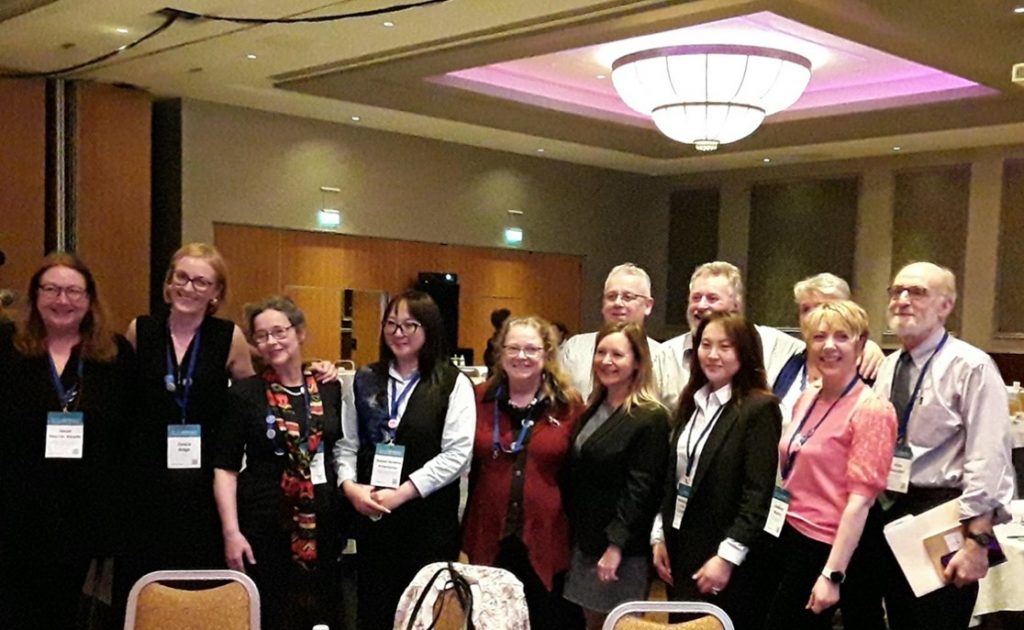By: Gary McNeely
May 30, 2024
This year’s 5th VPL Biennale, May 6 – 8 in Kilkenny, Ireland, established that prior learning assessment and recognition (PLAR), in all its forms and applications, is alive and well across the globe. This year’s event included participants from 31 countries across 5 continents, a record for the conference that was co-organized by Ireland, Canada, and the United States. During the opening reception in Kilkenny’s 13th century St. Canice’s Cathedral (shown below), a call for a show of hands revealed that Canada’s delegation was one of the largest.

The conference had a significant political edge. Its focus was on questioning how the validation of prior learning can be a demonstration of democracy in action. This validation affirms individuals’ purposes and roles, recognizes their knowledge and skills, and asserts their rights to inclusion and mobility within society. The panel discussions, concurrent sessions and series of lightning talks offered a wide array of perspectives on the role recognizing prior learning can play in expanding education and employment opportunities for individuals and social groups such as immigrants and the under-employed. Participants representing universities, colleges, employment agencies, and industry sectors outlined case studies on how the validation of prior learning can be applied to fit differing contexts. The array of viewpoints and projects was stunning. The conference program and more information of the presentations can be found at: https://vplbiennale.org/programme/
Tuesday night’s barbeque was a very festive affair after a long day of presentations and coffee-breaks to mingle and establish connections. The conference organizing community provided their thoughts on the day’s highlights, before the evening was capped off with a ruckus performance by a local Irish band. A few attendees took to the floor to show their attempts at an Irish jig.
Wednesday morning was dominated by broad policy statements regarding the importance of recognizing prior learning in the context of lifelong learning, social inclusion, and social justice. Opening the afternoon concurrent sessions, I was pleased to represent Brandon University and the Rural Development Institute at the conference. My presentation, co-authored by Dr. Wayne Kelly, offered a unique alternative to the usual take on prior learning. We contend that recognizing prior learning can also play a key role in building the capacity of individuals and organizations engaged in rural community development. Participants were responsive to the idea that recognizing learning is not always about acquiring credentials or job advancements. Rather, this learning can be reapplied to make future development project more impactful for a community. I was heartened by the response from several participants, which I hope will lead to continuing discussions and potential collaborations.
The closing session asked a panel to provide reflections on how the conference addressed its main themes – validating individuals, validating skills, validating for inclusion, and validating for mobility. This is a sample of their key takeaways and challenges needing attention:
- PLAR aspires to enhance inclusion, yet assessment frameworks can still create barriers for learners.
- PLAR is multi-purposed – the validation of prior learning enhances personal self-worth, employability, and social justice – but how to achieve these goals depends on the context.
- PLAR relies on clear guidelines and principles though it remains unclear whether these frameworks are prescribed or can be socially negotiated.
- PLAR is uniform in acknowledging all forms of learning, yet there is considerable geographic diversity in institutional frameworks and the sectors involved.
Conference participants were uniform in their desire to continue their discussion of these and other issues. Many, in fact, looked forward to hearing an announcement of the next VPL Biennale’s location to do just that. While no place was identified, I also look forward to presenting more research findings on RDI’s project on rural capacity building at this future conference or at another venue. This photo shows the pleasant relief of the organizing committee at the conference’s close alongside two delegates (front centre in white blouses) who ventured to Ireland from Mongolia.

The Kilkenny conference was truly inspiring and provocative in terms of how and where PLAR can be applied. For making this conference presentation possible, I would like to extend my appreciation for the financial support coming from Brandon University’s Registrar’s Office and the Rural Development Institute.
